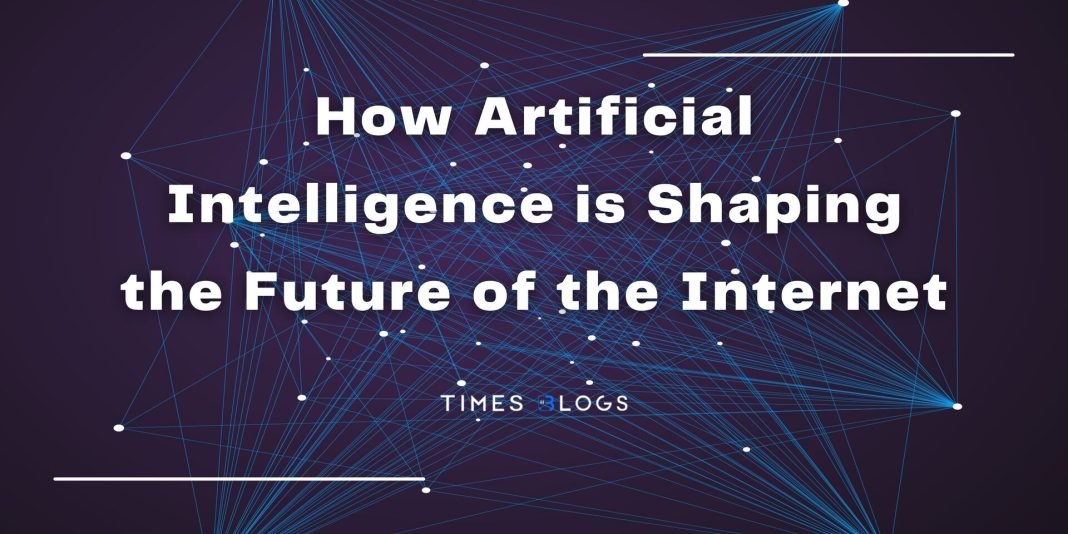Introduction
Artificial Intelligence (AI) is rapidly transforming the way we live, work and interact with the world. One of the areas where AI is having a significant impact is the internet. In recent years, AI has become an integral part of the internet ecosystem, powering everything from search engines and social media platforms to e-commerce and online advertising. AI is enabling new levels of personalization, automation and efficiency on the internet, while also raising important questions about privacy, security and ethics. In this blog, we will explore how AI is shaping the future of the internet, with a focus on some of the key applications and use cases.
AI-Powered Search Engines
Search engines are the backbone of the internet, helping us find the information we need quickly and efficiently. AI is playing an increasingly important role in search, with algorithms that can understand the intent behind queries and deliver more relevant and personalized results. For example, Google’s RankBrain is an AI algorithm that uses machine learning to understand the meaning of queries and deliver more accurate results. RankBrain can learn from user behavior and adjust its results accordingly, making it a powerful tool for improving search accuracy.
Another example of AI-powered search is the semantic search, which uses natural language processing (NLP) to understand the meaning of words and phrases. With semantic search, search engines can deliver more relevant results by considering the context of the search query, as well as related concepts and topics. This approach is particularly useful for complex queries or searches in specialized domains, such as scientific research or legal documents.
AI in Social Media
Social media platforms are some of the most popular and widely used websites on the internet, and AI is having a profound impact on how they operate. One of the key applications of AI in social media is content moderation, where algorithms are used to identify and remove harmful or inappropriate content. This includes everything from hate speech and harassment to fake news and disinformation.
Facebook, for example, uses a combination of AI and human moderators to identify and remove content that violates its community standards. The platform uses machine learning to analyze images and videos, detect hate speech and identify fake accounts. Meanwhile, Twitter has developed an AI-powered tool called Birdwatch, which allows users to annotate and fact-check tweets that are potentially misleading or false.
AI is also enabling new forms of personalization and recommendation on social media. By analyzing user behavior and preferences, AI algorithms can recommend content that is more relevant and engaging. This includes everything from news articles and videos to products and services. Instagram, for example, uses AI to recommend posts and stories based on user interests and engagement history.
AI in E-Commerce
E-commerce has been one of the biggest beneficiaries of AI in recent years, with algorithms that can improve everything from product recommendations to supply chain management. One of the key applications of AI in e-commerce is personalized product recommendations, where algorithms use data on user behavior and preferences to suggest products that are more likely to be of interest. This can increase sales and customer loyalty, while also improving the overall user experience.
Amazon is a prime example of how AI is transforming e-commerce. The company uses machine learning algorithms to make personalized product recommendations based on user search history and purchase behavior. The algorithms can also predict when a user is likely to run out of a particular product and suggest a re-order.
AI is also being used to optimize supply chain management, by improving inventory management and reducing waste. For example, Walmart has developed an AI-powered system that uses real-time data to manage inventory levels, reducing waste and improving efficiency. The system can also predict when demand for a particular product is likely to increase, allowing Walmart to stock up in advance.
AI in Online Advertising
Online advertising is another area where AI is having a significant impact. AI algorithms are being used to improve ad targeting and optimization, making ads more relevant and effective. This includes everything from search ads and social media ads to display and video ads.
Google Ads, for example, uses machine learning algorithms to optimize ad campaigns for maximum performance. The algorithms analyze data on user behavior and preferences, as well as ad content and placement, to deliver more targeted and relevant ads. Facebook also uses AI algorithms to optimize ad delivery and targeting, with features like lookalike audiences and automatic placements.
AI is also being used to combat ad fraud and improve ad verification. Ad fraud is a major problem in the online advertising industry, with estimates suggesting that it costs businesses billions of dollars each year. AI-powered solutions can help identify and prevent ad fraud by analyzing user behavior and identifying patterns that are indicative of fraudulent activity. Ad verification tools, which check whether an ad was delivered to its intended audience and viewed by a human, are also becoming increasingly sophisticated with the use of AI.
AI in Cybersecurity
Cybersecurity is a critical concern for anyone using the internet, and AI is playing an increasingly important role in protecting us from cyber threats. AI algorithms can analyze large amounts of data in real-time, identifying patterns and anomalies that may be indicative of a security breach. This includes everything from malware and phishing attacks to insider threats and data breaches.
AI is also being used to improve threat detection and response. With AI-powered threat detection, security teams can identify and respond to threats more quickly and effectively, minimizing the potential damage. AI algorithms can also automate certain security tasks, such as patching vulnerabilities and updating software, freeing up human resources for more complex tasks.
An example of AI-powered cybersecurity is the use of machine learning to detect and prevent fraud in online banking. By analyzing user behavior and transaction data, AI algorithms can identify patterns that may indicate fraudulent activity, such as unusual login attempts or suspicious transfers. This can help banks and financial institutions prevent fraud before it happens, protecting both customers and the institution itself.
AI and the Future of the Internet
AI is already transforming the internet, but its impact is likely to become even more profound in the coming years. Here are some of the ways AI is expected to shape the future of the internet:
- The Internet of Things (IoT): The IoT is a network of interconnected devices, from smart homes and cars to wearables and medical devices. AI algorithms will play a critical role in managing and analyzing the vast amounts of data generated by these devices, enabling new levels of automation, efficiency and personalization.
- Voice Search: Voice search is becoming increasingly popular, with the rise of smart speakers and virtual assistants like Amazon’s Alexa and Google Assistant. AI algorithms will be crucial for understanding and interpreting natural language queries, delivering more accurate and relevant results.
- Augmented and Virtual Reality: AR and VR are becoming more prevalent in the online world, from gaming and entertainment to e-commerce and education. AI algorithms will be used to create more realistic and immersive experiences, as well as to analyze user behavior and preferences for personalized content recommendations.
- Natural Language Processing: NLP is already being used for everything from chatbots and virtual assistants to content creation and translation. AI algorithms will continue to improve NLP, making it more accurate and effective, and enabling new use cases like sentiment analysis and speech recognition.
- Personalization: AI algorithms are already being used to personalize online experiences, from recommendations on e-commerce websites to news feeds on social media platforms. As AI continues to improve, personalization is expected to become even more sophisticated, with websites and apps tailored to each user’s preferences and behaviors.
- Healthcare: AI is already being used in healthcare for things like medical image analysis, drug discovery, and personalized treatment recommendations. As more data becomes available, AI is expected to play an even larger role in healthcare, enabling new levels of precision and personalized care.
- Content Creation: AI algorithms can already generate content like news articles and product descriptions. As AI continues to improve, it is expected to become even more sophisticated, with the ability to create more complex content like video and audio.
- Autonomous Systems: Autonomous systems like self-driving cars and drones rely on AI to navigate and make decisions. As these technologies become more advanced and widespread, they are expected to transform transportation and logistics, enabling new levels of efficiency and safety.
- Social Impact: AI has the potential to make a significant social impact, from improving access to education and healthcare to reducing bias and discrimination. However, it also raises important questions about job displacement and the ethical use of data.
Conclusion
AI is shaping the future of the internet in profound ways, enabling new levels of personalization, efficiency and automation. From search engines and social media platforms to e-commerce and online advertising, AI is transforming how we interact with the online world. However, as AI becomes more pervasive, it also raises important questions about privacy, security and ethics. It is important for businesses and individuals to understand the potential benefits and risks of AI, and to use it in a responsible and ethical manner.




